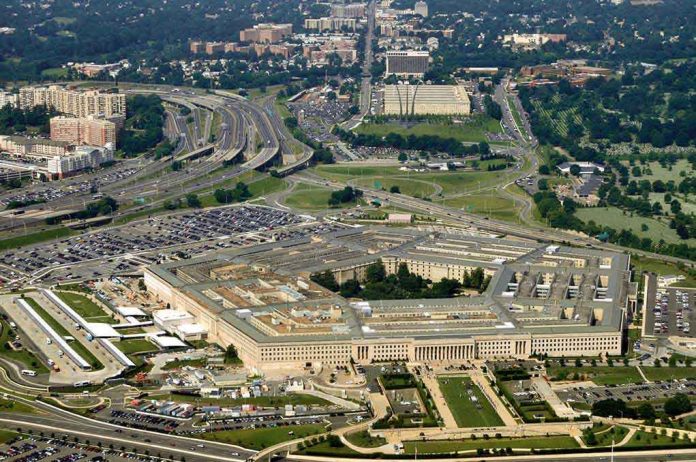
Pentagon secrecy sparks bipartisan outrage, raising alarms about unchecked power and threats to constitutional oversight.
Story Snapshot
- The Pentagon delayed informing Congress of major policy office restructuring, igniting bipartisan criticism.
- Lawmakers argue the lack of transparency undermines civilian control and constitutional oversight.
- Recent events fuel calls for stricter reporting and accountability in defense policy changes.
- Experts warn poor communication could set damaging precedents for future executive-legislative relations.
Pentagon Delays Notification of Major Policy Changes
On October 8, 2025, the Pentagon outlined significant changes to its policy office, including merging roles, dissolving positions, and renaming posts. However, Congress did not receive the official notification letter until November 2, weeks after decisions were made and enacted. This delay led to immediate criticism from both Republican and Democratic senators, who accused the Pentagon of stonewalling and bypassing essential oversight mechanisms crucial to maintaining civilian control of the military.
Senators from the Armed Services Committee highlighted the importance of timely communication, emphasizing that Congress relies on accurate and prompt updates to exercise its legislative and budgetary authority over defense matters. The lack of consultation and transparency in the Pentagon’s internal reforms was described as a “Pigpen-like mess” by Sen. Tom Cotton, illustrating growing frustration over executive branch opacity. This incident is part of a broader pattern, as lawmakers cite ongoing trends of restricted communication from the Pentagon.
Bipartisan Criticism and Constitutional Concerns
Bipartisan criticism intensified during Senate hearings on November 5, 2025, where both parties voiced alarm over the Pentagon’s disregard for established protocols. Congressional leaders stressed that transparency is not optional—it is a constitutional requirement that ensures civilian oversight and guards against executive overreach. The restructuring of the Pentagon’s policy office without prior consultation raised concerns that military autonomy could erode the delicate balance of power outlined by the Founding Fathers.
Historically, Congress has played a vital role in defense oversight, shaping reforms through legislation such as the Goldwater-Nichols Act. Lawmakers now warn that continued breakdowns in communication could set damaging precedents, weakening Congress’s ability to hold the Pentagon accountable. Calls for legislative action to enforce stricter reporting requirements are mounting, with many viewing this conflict as a test for the future of civil-military relations.
Expert Analysis and Long-Term Implications
Defense analysts caution that poor communication not only undermines effective oversight but also increases the risk of policy missteps with far-reaching consequences. The erosion of trust between Congress and the Pentagon may delay critical defense initiatives, heighten partisan and bipartisan tensions, and jeopardize funding for essential programs. Civil-military relations experts argue that robust congressional oversight is essential to prevent executive branch overreach and protect the constitutional foundation of U.S. governance.
Pentagon faces bipartisan criticism over lack of communication with Congress https://t.co/RDftGo05Xp #FoxNews
— jaybakerAZ (@jaybakeraz) November 5, 2025
The broader defense community, including contractors and allied agencies, faces uncertainty as leadership changes and policy direction remain unclear. If Congress responds by conditioning or withholding funding, there could be significant economic repercussions. The Pentagon’s internal autonomy, while necessary for efficient operations, must be balanced with transparency obligations to ensure that national security decisions reflect both military expertise and constitutional safeguards.
Broader Impact on Conservative Values and Oversight
For conservative Americans concerned about government overreach, fiscal mismanagement, and erosion of constitutional rights, the Pentagon’s lack of transparency is a direct challenge to core values. The breakdown in communication highlights the need for vigilance in protecting the principles of limited government and individual liberty. As President Trump’s administration continues to prioritize accountability and restore constitutional order, Congress’s response to Pentagon secrecy will serve as a bellwether for broader efforts to defend conservative values, family security, and robust oversight of federal agencies.
Sources:
Pentagon policy shop stonewalling Congress, Republican senators say
Senator Overseeing Pentagon Says Congress in the Dark on Changes


